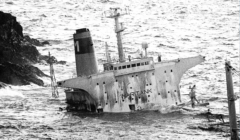Letters / Red herrings and rogue tankers
Shetland Islands Council’s convener, Malcolm Bell, is quoted in the local press as saying that I should know from my time as a councillor that the council “does not have direct legal authority to stop shipping anchoring off Shetland”.
From my time as a councillor (1993-95 and 2008-2017) and earlier, as a reporter covering the development of Sullom Voe since 1976, I do indeed know that. I do not need Mr Bell to tell me about his wholly irrelevant lack of legal authority. It is a red herring.
What I also know is that after the Esso Bernicia fiasco on 30 December 1978 and the subsequent offshore dumping of tankers’ oily ballast water in early 1979, an agreement was reached between the council and the oil companies.
There was a grand re-launch of their new Sullom Voe safety rules in June 1979 when the SIC and BP made loud public noises about ‘the Rolls Royce of ports’.
That agreement included a provision that tankers bound to or from Sullom Voe should keep at least 10 (later 20) miles offshore except when they were approaching Yell Sound — where there would be a fleet of tugs to assist them if they got into trouble. If Mr Bell does not understand this he should ask the former SIC director of marine operations, Captain George Sutherland, who knows more about it than either of us.
Since 1978 Sullom Voe has indeed been one of the cleanest oil ports in the world and, apart from one major incident, there has been no very serious pollution from tankers off our coast. That happy state of affairs did not come about by accident.
The wreck of the Braer on 5 January 1993 revealed a gap in our safety net and this were plugged by April of that year in a revision of the agreement between the council and the oil company partners at Sullom Voe.
Become a member of Shetland News
This was trumpeted by the council and by BP and partners as ‘The Shetland Standard’.
Like the original 1979 deal, it was made under the authority of the Sullom Voe Association Ltd (SVA), the unique organisation which (as Mr Bell knows because he is one of the two council directors on the four-member SVA board) is legally responsible for the operation of the oil terminal and its tanker traffic.
For 41 years, until about six months ago, Sullom Voe tankers complied with these sensible safety precautions, not because the council has legal powers but because the oil terminal partners voluntarily agreed to enforce compliance using commercial, not legal, sanctions.
The companies included the Sullom Voe safety conditions, including routeing requirements, in a pre-loading checklist that every tanker had to complete before she was allowed to enter the port.
If a tanker was not in compliance then the oil companies, not the council, would refuse to load her.
Over the years several delinquent shipping companies have lost a lot of money by discovering that the agreement meant exactly what it said.
Coastal local authorities and environmental organisations from Alaska, Canada, Russia, France, Germany and several African countries have studied ‘The Shetland Standard’, admired it and often wished they had negotiated similar deals.
Now, because our councillors took their eye off the ball and allowed their officials to stop enforcing the deal with the Sullom Voe partners, this world-class reputation is in danger.
There is no need for prolonged or delicate negotiations here. All Mr Bell has to do is write to the terminal operators, reminding them of the agreement to which they are a party, and requiring them to adhere to it with immediate effect.
Unless, that is, someone in the council quietly made a new agreement without telling the public. Did they? I think we should be told.
Jonathan Wills
Honorary Warden
Noss National Nature Reserve
Become a member of Shetland News
Shetland News is asking its many readers to consider paying for membership to get additional features and services: -
- Remove non-local ads;
- Bookmark posts to read later;
- Exclusive curated weekly newsletter;
- Hide membership messages;
- Comments open for discussion.
If you appreciate what we do and feel strongly about impartial local journalism, then please become a member of Shetland News by either making a single payment, or setting up a monthly, quarterly or yearly subscription.















































































